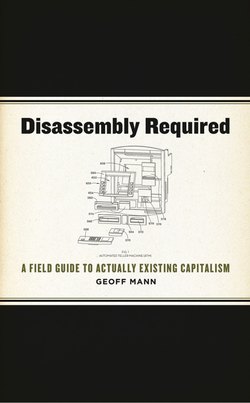Disassembly Required

Реклама. ООО «ЛитРес», ИНН: 7719571260.
Оглавление
Geoff Mann. Disassembly Required
Отрывок из книги
The book you hold is the product of many minds (and twice as many hands, I suppose). I would love to take sole credit for it, but ultimately the flaws are the only thing I worked out on my own. The good comes from the sharp eyes of my coworkers, students, and friends. The project began with the Purple Thistle Institute, an alternative to university run in the summer of 2011 by the Purple Thistle Centre, a youth collective in East Vancouver. The participants in the Institute brought energy and insight, and gave me the motivation I needed. I thank them all, especially Dani Aiello, who subsequently joined the Thistle collective and has been a continued help and support (as have the folks who work at the coffee shops where I did a lot of the writing, especially Derek Mensch, whose endless curiosity is a real inspiration). A few people in particular have dedicated a lot of critical energy to some complete version or another of this, and all of them have helped make it a whole lot better, especially Michelle Bonner, Kate Khatib, Carla Bergman, Matt Hern, and Sanjay Narayan.
Carla and Matt, the people behind the Thistle, are the reason this book exists. They have been enthusiastically encouraging me since I began writing, and I don’t think I have ever told them how important that has been. In addition to motivating me at the start, Matt also led me to AK, and to Kate Khatib and Charles Weigl, my awesome editors. Everyone at AK has been excellent, but Kate and Charles have gone above and beyond. So much of their work is here that I kind of feel like a co-author. Where I work, I have long leaned on Eugene McCann, Roger Hayter, Nick Blomley, Paul Kingsbury, and Ian Hutchinson (and, just as heavily, on Joyce Chen, Marion Walter, and Liliana Hill). As a “teacher” (I put it in scare quotes because it is not always clear who is teaching whom), I have had extraordinary luck, in the form of Becky Till, Calvin Chan, Emily Macalister, Michelle Vandermoor, Rebeca Salas, Stuart Hall, Victoria Hodson, Mark Kear, and Chloe Brown. Not every teacher is so fortunate, and I am very grateful. In addition, Nik Heynen, Scott Prudham, Jake Kosek, and Brett Christophers are all you could ever wish for in a most enjoyably unprofessional “professional” community. The word “colleague” does them a disservice.
.....
1 It would be a mistake, for example, to think there is something inside most of us that rejects slavery (as a way of organizing production) as categorically wrong, that “human nature” is genetically coded to prioritize freedom for all. We refuse to sanction slavery for a variety of reasons today, but “natural” opposition is not one of them. The historical record might as easily suggest the opposite: that we are “naturally” prone to slavery-like relations. There is no basis for either position. History and social life, not human DNA, determine the status of slavery and every other mode of social organization. We are against slavery today because it is socially condemned, and we have learned, through much struggle and suffering, not to condone it. Slavery, and opposition to slavery, are social relations.
2 The mode of production “box” in which the Soviet Union or today’s China should be put is the subject of considerable debate. Some say that both are in fact forms of “state capitalism.” I disagree. This is (perhaps fortunately) not the place to enter into this debate in any detail. Let me just briefly say that given the definition of capitalism laid out above, the political-economic system of the USSR clearly cannot be capitalist. Moreover, the state apparatus in the USSR was not dedicated to surplus value maximization, even in its last stages, but to more “political” goals, the first of which was authoritarian control via the aggrandizement of its productive apparatus. “State socialism” would seem to capture this for me. I think even the idea that after Stalin the USSR was capitalist is a red herring meant to lump its failings in with capitalism’s and, for some Marxists, to deflect the critique that its failings were not due to its “capitalism,” but in no small part to its incompetent socialism. In many ways, it was socialist, really socialist, and that might very well have been the problem. Suggestions that the USSR’s failings are capitalist mischaracterize history: the Soviet Union was not a different spin on capitalism. It was a totally different beast, in which the capitalist imperative was not necessarily primary. This book shows that the term “capitalist” cannot describe it adequately. The closest thing to state capitalism of which I have any detailed knowledge is Mussolini’s Italy, and even that is arguably not very close.
.....